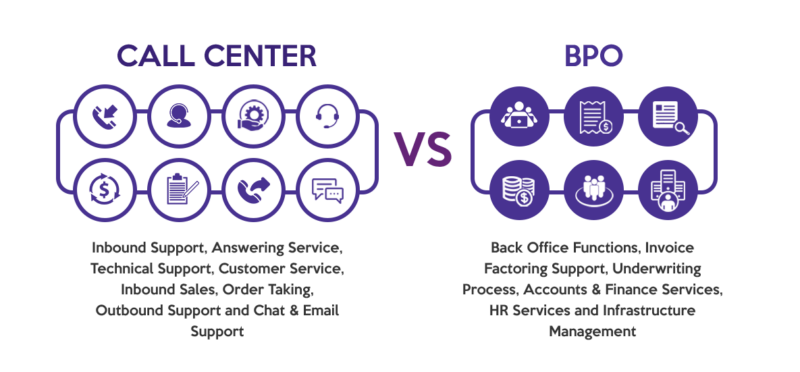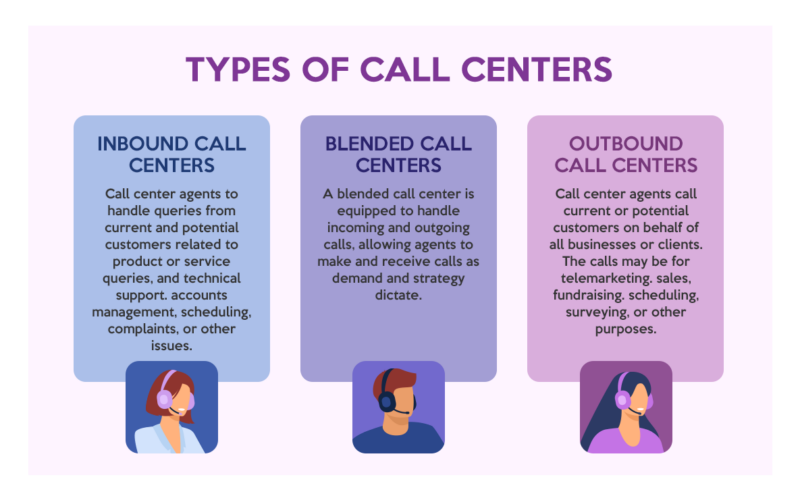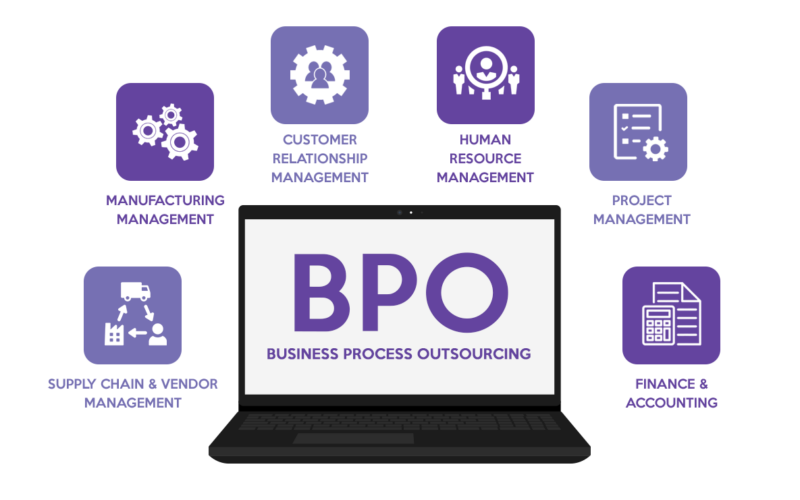In today’s highly competitive and fast-paced business environment, outsourcing has become an essential strategy for companies seeking to enhance productivity, efficiency, and cost-effectiveness. Many have heard about Call Centers and Business Process Outsourcing (BPO), yet the distinction between the two is often blurred.

This article aims to delineate the differences, benefits, and optimal use cases for Call Centers and BPOs, catering to those decision-makers in leadership positions and other companies.
What is a Call Center?
In its most fundamental sense, a call center is a centralized office used for receiving or transmitting large volumes of inquiries by telephone calls. These inquiries can be inbound, such as customer service requests and tech support, or outbound, like telemarketing, customer surveys, or debt collection calls.

Call centers typically operate through extensive use of advanced telecommunication technology that enables the efficient routing and handling of calls.
Benefits of a Call Center
Cost-effectiveness
Managing a call center within the confines of your own business premises can be a significant financial burden, primarily due to several unavoidable costs associated with its establishment and operation. To begin with, the technical infrastructure is a substantial component of these costs, encompassing the need for high-quality, reliable hardware that can handle the volume and nature of the calls efficiently. This hardware could include advanced computer systems, telecommunication devices, servers, and more.
Moreover, there’s a considerable investment required for the acquisition of appropriate software that will power your operations. This software might encompass CRM systems, automated dialers, call recording and monitoring software, helpdesk solutions, and other applications that are critical for the smooth running of a call center.
Outsourcing call center operations to a third-party service provider can provide a cost-effective alternative. These providers already have the necessary infrastructure in place, including both hardware and software, and are staffed by skilled professionals who are experts in handling customer service interactions. The economies of scale that these providers enjoy, due to their focus on providing these services to multiple companies, often allow them to offer these services at a cost significantly lower than what it would take to operate an in-house call center. This shift to outsourcing can lead to substantial cost savings, providing businesses with more flexibility to allocate their resources more strategically.
24/7 Customer Support
In today’s interconnected and globalized business environment, the importance of delivering continuous, round-the-clock customer service cannot be overstated. The nature of today’s markets necessitates that businesses cater to customers across various time zones and respond to their queries, concerns, or needs promptly, regardless of the hour.
The concept of a traditional ‘9 to 5’ customer service window has been fundamentally disrupted by this shift towards globalization. Customers now expect to be able to reach out to businesses at their convenience, regardless of the time. As such, providing 24/7 customer support has become less of a luxury and more of a necessity in this global landscape.
This is where the strategic benefit of outsourcing to Business Process Outsourcing (BPO) and call center service providers comes into play. These entities specialize in delivering dedicated call center services that function beyond the regular business hours. BPO and call centers have the infrastructure, resources, and trained personnel in place to manage customer interactions on a 24/7 basis.
The ability of BPO and call center service providers to operate across multiple shifts allows them to cover the entire spectrum of the day, offering businesses the advantage of ‘always-on’ customer service. This capability is especially crucial for businesses that have a global customer base, where inquiries can come in from different parts of the world at any time of the day or night.
Focus on Core Business Operations
Delegating call center functions to an outsourced service provider is a strategic move that many businesses are turning to today. The reason for this is clear: it grants companies the ability to redirect their attention and resources towards their primary competencies and strategic objectives.
Managing both inbound and outbound phone calls can be an intricate and demanding operation that requires a significant amount of time and expertise. This is particularly true when dealing with the complexities of an outbound call center. These include a variety of tasks such as training employees, monitoring their performance, keeping up with the latest in technology and software, and ensuring regulatory compliance, among other responsibilities.
Enhanced Customer Satisfaction
Call centers operated by professional service providers are often staffed with highly skilled personnel who have undergone comprehensive training. These experts, backed by established and efficient procedures, are well-equipped to handle a diverse range of customer issues. Such a structured and proficient approach to customer service can lead to an enhancement in customer satisfaction levels, potentially fostering deeper customer loyalty to your business.
Quick Scalability
In moments of swift business expansion or during peak seasonal periods when demand spikes, outsourced call centers demonstrate their agility and resilience. They have the ability to rapidly scale their operations and adjust their resources to efficiently manage and accommodate the increased volumes of customer calls.
When to Resort to a Call Center
Organizations typically resort to call center outsourcing when they experience a high volume of customer inquiries or complaints, require 24/7 customer support, or during periods of business expansion. Outsourcing becomes particularly relevant when an internal team lacks the capacity or specific skills to handle customer interactions effectively.
What is Business Process Outsourcing (BPO)?
Business Process Outsourcing, describes the strategic approach of delegating non-core business activities and functions to an external service provider. The range of services encompassed within BPO is extensive and includes both traditional functions and more advanced operations.
Traditional functions managed under BPO services often include areas like accounting, human resources, and customer service, which are integral to any organization but may not form part of the company’s primary value proposition. For instance, a company may utilize BPO services to manage its outbound calls, ensuring efficient and effective communication with existing customers without having to maintain an in-house call center service.

More complex operations handled under the BPO umbrella could include IT services and software development. These specialized functions require high levels of technical expertise and are increasingly being outsourced by companies seeking to tap into global talent pools and cutting-edge technological capabilities.
Furthermore, BPO services can extend into the realm of digital marketing, where expert providers can handle anything from content creation to SEO optimization, social media management, and more.
Another important area covered by BPO services is the management of front office processes. This includes all customer-facing operations, from reception and help desk services to an outbound call center focused on customer acquisition and retention.
Benefits of BPO
Access to Global Talent and Expertise
BPO extends to companies the opportunity to tap into a global reservoir of skills and expertise. This access is particularly beneficial in specialized areas where a company might find itself deficient or lacking in proficiency. Thus, BPO essentially bridges the knowledge and skill gap, providing companies with world-class capabilities to further their business objectives.
Cost Savings and Efficiency
By leveraging the principle of economies of scale, Business Process Outsourcing (BPO) providers are often able to carry out various tasks with greater efficiency and at a reduced cost compared to in-house teams. This is primarily because BPOs are designed to handle large volumes of specific tasks, thereby spreading their fixed costs over a larger output, which leads to lower per-unit costs.
Scalability and Flexibility
Business Process Outsourcing (BPO) entities have the capability to rapidly scale their operations up or down in accordance with the growth or contraction of a business. This scalability is crucial in ensuring that the services provided align seamlessly with the ever-changing needs and circumstances of the business.
Enhanced Focus on Core Business
Similar to the function of call centers, BPO enables businesses to strategically allocate their resources more effectively, specifically towards their core competencies. This approach provides companies with the flexibility to focus their time, energy, and capital on areas that are fundamental to their business performance and growth.
Technology and Infrastructure Investment Savings
BPO organizations are typically equipped with sophisticated technology and established infrastructure. This pre-existing technological capacity and operational framework offer a significant advantage to companies that choose to engage with them. It essentially eradicates the necessity for these companies to make substantial investments in these areas themselves.
The advanced technology often already at the disposal of BPOs spans across various software applications, platforms, and hardware essential for conducting diverse business functions. This readily available infrastructure is not only technologically advanced but is also regularly updated to keep pace with evolving trends and requirements.
Thus, by choosing to outsource to a BPO, companies can bypass the costs and time involved in setting up, managing, and updating their own technology and infrastructure. They can instead reap the benefits of the BPO’s advanced technology, without having to worry about the accompanying overhead and maintenance costs. This can significantly enhance operational efficiency and allow companies to focus their resources on their core competencies.
When to Resort to BPO
Organizations often turn to Business Process Outsourcing (BPO) as a strategic tool under several circumstances that demand a more streamlined and efficient approach to conducting business operations. One such situation arises during periods of rapid growth. As a company expands, its operational needs grow exponentially, and managing all aspects in-house can become increasingly complex and resource-intensive. Outsourcing non-core processes to a BPO provider can help manage this complexity, allowing the company to maintain focus on its growth trajectory.
Additionally, there are instances where the necessary specialized skills for a particular task or project are not present within the company’s internal team. For example, a company might need expertise in a niche technological field or a specific aspect of digital marketing for a short-term project. In such cases, resorting to BPO provides access to a wide global talent pool with the specific skills required, negating the need for investing in long-term hires or extensive training programs.
Cost reduction is another major factor driving organizations towards BPO. Operating certain functions in-house can often be expensive, considering the costs associated with hiring and training staff, purchasing and maintaining technology, and managing operational overheads. Outsourcing these functions to a BPO provider can significantly reduce these costs, allowing the company to direct more of its budget towards its core business functions.
Call Center VS BPO – Understanding the Differences
Despite the obvious similarities, call centers and BPOs serve different functions and have distinct characteristics. While a call center primarily focuses on customer interaction via telephone, BPO covers a broader array of outsourced functions spanning multiple business areas. In fact, a call center can be a part of the services provided by a BPO firm. The decision between the two often depends on the specific needs and strategic objectives of a business.
Final Verdict
Outsourcing, whether it involves specific tasks such as call center technical support or broader BPO services, presents an array of substantial benefits for businesses. These advantages range from significant cost savings and gaining access to global talent and expertise, to the freedom to concentrate more fully on core business competencies.
For business decision-makers, it’s vital to fully comprehend the differences between these outsourcing options, as well as their potential benefits. This understanding aids in making an informed decision that closely aligns with their business objectives and fosters growth and efficiency.
Call to Action
Evaluating your business’s unique needs and circumstances is essential as a leader in your organization. Do you need a dedicated call center to manage customer interactions, or does your business require more extensive outsourcing encompassing various functions? Understanding the differences between Call Centre and BPOs makes you better equipped to make strategic decisions that can drive your business forward.



Leave A Comment
You must be logged in to post a comment.